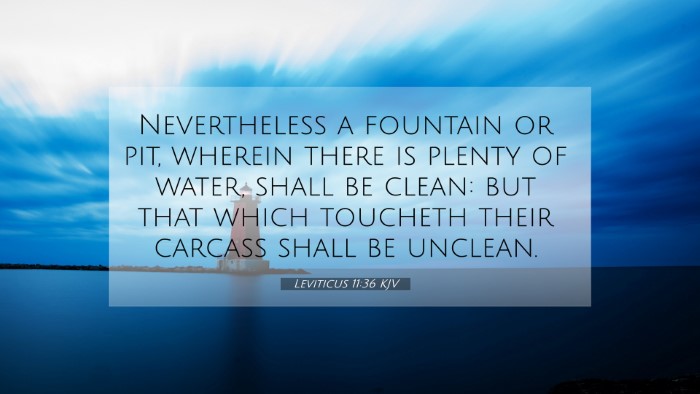Understanding Leviticus 11:36
Bible Verse: Leviticus 11:36 - "Nevertheless a fountain or pit, wherein there is plenty of water, shall be clean: but that which toucheth their carcase shall be unclean."
Verse Meaning Summary
Leviticus 11:36 addresses the concept of cleanliness and impurity in relation to the handling and consumption of animals, specifically concerning their carcasses. This verse emphasizes that water sources, such as fountains and pits, remain clean unless contaminated by touching a dead body. This illustrates an important principle regarding the transmission of impurity and the distinction between clean and unclean in the context of Jewish law. Both physical and spiritual cleanliness are key themes in this chapter.
Commentary Insights
-
Matthew Henry:
Matthew Henry notes that the sanitary laws provided in Leviticus aim not only to ensure physical health but also to maintain spiritual holiness among God's people. He interprets the cleanliness of water sources as indicative of the purity that God desires in worship and daily life.
-
Albert Barnes:
Albert Barnes emphasizes the practical aspect of this law, stating that while the carcass is deemed unclean, the water that is drawn from clean sources maintains its purity. He posits that God’s laws serve practical purposes while also reflecting deeper spiritual truths about life and death.
-
Adam Clarke:
Adam Clarke draws attention to the concept of separation in this verse. He highlights the significance of keeping what is sacred untouched by death, demonstrating the importance of maintaining spiritual integrity and distinguishing between the holy and unholy as per God’s instructions.
Cross-References and Thematic Connections
This verse connects to several other biblical themes and verses concerning cleanliness, purity, and holiness. The following are significant cross-references:
- Numbers 19:11-13: Discusses the impurity that comes from touching a dead person and the ritual required for purification.
- Leviticus 11:24-25: Further illustrates the laws concerning unclean animals and their impact on cleanliness.
- Deuteronomy 14:21: Addresses similar issues of cleanliness in relation to food and the treatment of carcasses.
- 1 Corinthians 10:21: Paul reflects on holiness and unclean practices, drawing parallels to Old Testament laws.
- Isaiah 52:11: Speaks to the concept of being clean and the call to depart from unclean things.
- Ezekiel 36:25: God promises to cleanse His people, symbolizing spiritual purity essential in worship.
- Hebrews 9:14: Offers insight into the purification that comes through Christ, linking New Testament themes to Old Testament practices.
Thematic Analysis
The recurring themes in Leviticus 11:36 invite deeper reflection on:
- Physical versus Spiritual Cleanliness: The distinction highlights the necessity of maintaining both types of purity.
- Ritual Purity: The laws in Leviticus govern community practices and personal conduct, emphasizing obedience to God.
- Life and Death: The interactions with dead bodies represents broader themes of mortality and the sacredness of life.
Tools for Bible Cross-Referencing
Understanding how to traverse these connections encourages a richer study of scripture:
- Bible Concordance: Utilize a concordance to find words and themes linked to this verse.
- Bible Cross-Reference Guide: Reference guides help identify pertinent verses connected thematically.
- Cross-Reference Bible Study: Employ systematic methods to analyze themes across various scriptures.
Conclusion
Leviticus 11:36 serves as a significant marker in understanding the cleanliness laws of the Bible, which inform both physical practices and spiritual understandings. By examining this verse through various commentaries, we gain insight into God’s intention for His people in maintaining purity. Cross-referencing with related scriptures fosters a deeper comprehension of biblical teachings and their applications throughout the scripture.




